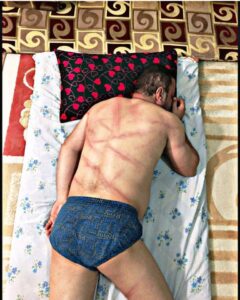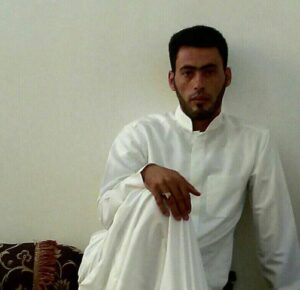Iranian regime demeans and devalues the international treaties to which it is a signatory. As one of the world’s most prolific perpetrators of torture, the regime’s abuses against Ahwazi prisoners in its jails not only breach its commitment but also disregard its own constitution, whose 38th Article prohibits torture, stipulating “All forms of torture for the purpose of extracting confessions or acquiring information are forbidden.”
The brutal and systematic physical and psychological torture of Ahwazi and other prisoners are the norm rather than the exception in the regime’s prisons and infamous ‘black site’ secret detention centres, which are essentially custom-built torture facilities.
This report aims to highlight a few of the horrendous cases of abuse against Ahwazi political detainees in Iran’s prisons.
According to Ahwazi rights groups, 32-year-old Ali Hilichi, a resident of Al-Ghameej (West Islamabad) neighbourhood of Ahwaz capital, was arrested at his workplace, a local carwash, in November 2018 by Iranian regime intelligence agents, accused of participating in recent public demonstrations in Ahwaz. He was taken to a regime prison where he was kept in solitary confinement and subjected to severe torture for weeks before being released at the end of December. Following his release, family members took these photos to document the marks left on his body from the torture, which they forwarded to international human rights organisations overseas.

Ali, a married father of one, told the human rights activists that he continues to suffer from excruciating pain, as well as from psychological and emotional trauma as a result of the torture.
His wife, meanwhile, said that when he was freed, his body was covered in bruises and welts from the beating, adding that he could not even get into a shower due to the agonising pain from his injuries, and can only sleep on his stomach due to the pain from the injuries from his back where he was whipped, as well as suffering excruciating pain in both his knees.
She also revealed that he has been suffering from nightmares since his release, screaming and crying, begging, “Don’t beat me…give me water.”
The human rights groups within Ahwaz who reported Ali’s story preferred not to give their real identities due to an extremely well-founded fear of persecution because of exposing the regime’s crimes.
In a similar case, on January 5th human rights activists have appealed for international intervention to save the life of another Ahwazi dissident subjected to years of horrific torture by prison staff, including being beaten unconscious whilst suspended on a crucifix in the prison courtyard.

32-year-old Hassan Bayt Abdullah, from the village of Bayt Khalaf Moslem near the city of Susa, was arrested in mid-October 2015 on charges of ‘enmity against God’ and ‘acting against national security’, charges commonly used against dissidents.
After reportedly being tortured into confessing his ‘guilt’, he was sentenced to 25 years imprisonment following a typical kangaroo trial lasting a few minutes at a regime ‘revolutionary court’, where his forced confession was used as the sole evidence against him. As is standard practice, he was denied any legal representation.
Fellow inmates at the Masjid Suleiman Prison in Ahwaz managed to smuggle a message to Hassan’s family to inform them that, due to Hassan’s defence of his fellow prisoners, including efforts to get prison staff to provide clean drinking water, he has been repeatedly subjected to horrific torture.
The inmates told his family that last Friday, prison guards had dragged Hassan to the prison courtyard from the overcrowded cell where he’s kept with other inmates. There, the guards ripped off his clothes, leaving him in his underwear in the freezing winter cold, before tying him by his hands and feet to a crucifix erected in the yard, and beating and whipping him till he fell unconscious. The other inmates reported that while beating and whipping Hassan, the guards screamed vile, racist anti-Arab abuse at him, with one of the guards telling him that their beating was a “lesson for others who dare to raise their voices to us, you Arab asshole”.
In their message, the inmates said that Hassan has been denied any medical treatment for the injuries he sustained in this ferocious assault or previous injuries inflicted under torture by the guards at this prison or the prison he was transferred from, urging his family members to intervene on his behalf to seek urgent medical treatment due to the severity of his injuries, which they warned may be fatal if left untreated.
According to human rights activists in Ahwaz, Hassan was returned to the Masjid Suleiman Prison from Isfahan Prison in central Iran on December 3, 2018, along with two other Ahwazi activists, Abdullah Abdullahi (Kaabi) and Qasem Abdullahi (Kaabi), both from the Shwour neighbourhood of Susa (Shush in Farsi). All three were returned from Isfahan Prison in central Iran to the prison in Ahwaz on Monday, December 03, 2018. Both prisons are infamous for their torture.
Abdullah Abdullahi, a married 34-year-old father of three children, was detained along with Qasem Abdullahi and six other Ahwazi activists in raids on their homes on October 21, 2015. After almost two years of detention, all eight were tried together at the Ahwaz Revolutionary Court Branch One on August 31, 2017, on fabricated charges of enmity to God, having foreign contacts, membership in anti-regime groups, and distributing anti-regime propaganda. As usual, the only evidence against them was fabricated ‘confessions’ extracted under torture.
Of the eight men, Abdullah Abdullahi and Qasem Abdullahi were sentenced to death. After their families challenged this verdict in the Supreme Court, their sentence was postponed, and they are still awaiting the final verdict. Both Abdullah and Qasem were reportedly severely tortured at an Iranian regime security services detention centre before being transferred to Isfahan Prison after being handed down the original verdict.
Hassan Bayt Abdullah, who was originally sent to Masjid Suleiman prison, has reportedly been routinely subjected to torture in retaliation after protesting at guards’ daily mistreatment, verbal and physical abuse of himself and other inmates, and the various forms of other abuse to which they were subjected, including a diet of inedible, often rotten, food– mostly consisting of a daily bowl of watery lentil ‘soup’ with a piece of bread, usually stale.
Hassan had apparently repeatedly insisted that he and other prisoners should be allowed fresh fruit and vegetables in their diet, along with drinkable water rather than the foul-smelling fetid and often rust-coloured tap water in the prison which is the only source of water and which made many ill.
Although many prisoners asked visiting family members to bring them fruit and vegetables during the weekly visits, foodstuffs left with prison staff would invariably either be confiscated, or prison staff would refuse to accept it, on the pretext that they could not tell if it would be healthy for the prisoners.
Hassan’s demonstrations of dignified behaviour on his own and others’ behalf and refusal to accept the dehumanising and demeaning treatment of prisoners apparently enraged the prison staff, who subjected him to vicious beatings.
Hassan’s family said that they hold the director of the Masjed Suleiman Prison, Khosrow Hashempour, accountable for their son’s suffering, adding that, in addition to the signs of torture clearly visible on him during visits, he had become emaciated as a result of severe illness due to the prison diet and drinking the fetid polluted water.
Hassan’s desperately worried parents said that in their last phone call with him, he was uncharacteristically dejected and tearful, crying throughout the call, begging family members for forgiveness and expressing despair and hopelessness about his life, before the call was abruptly disconnected.
According to human rights activists in Ahwaz, a number of prisoners in the Masjid Suleiman Prison are reportedly in a critical condition as a result of abuse which has devastated their psychological and emotional wellbeing as well as their physical health.
1-Abdulrahman Asakereh, a chemistry teacher, cultural activist and one of the members of the Al-Hiwar (‘Dialogue’) institute from Khalafieh (Ramshir) city, was arrested in November 2009 and sentenced to 20 years imprisonment by the infamously harsh Judge Sayed Mohammad Baqir Mousavi, the head of the Ahwaz Revolutionary Court Branch Two on charges of ‘enmity to God, spreading sedition on earth, acting against the regime and distributing anti-regime propaganda. Although he was early deported outside the Ahwaz region to Mashhad Prison (a common additional unofficial punishment ensuring that prisoners’ families are unable to visit them regularly), he was recently returned to the Masjid Suleiman Prison. Abdulrahman is suffering from severe gastrointestinal diseases, cholesterol, and high blood pressure.
2: Ali Helfi, a 51-year-old political activist from the city of Hamidieh, was arrested in 2005. He was sentenced to 30 years imprisonment in Gonabad Prison on charges of acting against national security, enmity to God and corruption on earth in a kangaroo trial at Branch One of Ahwaz Revolutionary Court, and was recently transferred to the Masjid Suleiman Prison. Ali suffers from severe digestive problems. At the time of his arrest, Ali suffered from a fractured sternum during torture by regime security services; although he underwent surgery to repair it, it has never properly healed and has affected his health ever since.
3: Ahmad Abdullahi (Kaabi), a friend of Hassan Abdullah’s who was arrested at the same time, is a 31-year-old poet from the city of Susa. He was sentenced to 25 years imprisonment on the same charges, with the same lack of any substantiating evidence. He is suffering from illness related to injuries from torture.
Whilst all of the aforementioned prisoners suffer from serious illnesses and desperately need treatment, their families said that the prison has denied them any medical treatment, as well as rejecting appeals to allow the families to bring any medicines or medical materials, such as bandages and ointments to provide some relief.
In all the above cases and in the relentless racist abuse which is a thread running through all the regime’s mistreatment of Ahwazis, the regime is breaching the terms of all the human rights treaties and legislative articles to which it is a signatory.
According to the terms of the UN General Assembly Resolution 45/111 issued on December 14, 1990:
1: All prisoners shall be treated with the respect due to their inherent dignity and value as human beings.
2: There shall be no discrimination on the grounds of race, colour, sex, language, religion, political or other opinion, national or social origin, property, birth or other status.
3: Prisoners shall have access to the health services available in the country without discrimination on the grounds of their legal situation.
Unfortunately, for Iran’s regime, as for other human rights abusers in the region, treaties and UN resolutions are meaningless verbiages with no penalties for failing to uphold their terms. Meanwhile, human rights organisations domestically and internationally continue to be deafeningly silent on the monstrous crimes perpetrated by the regime against Ahwazis generally and against Ahwazi dissidents in particular. Without urgent action to help these prisoners, they are likely to become just more faceless victims of the regime’s killing machine.
By Rahim Hamid, an Ahwazi author, freelance journalist and human rights advocate. Hamid tweets under @Samireza42.
